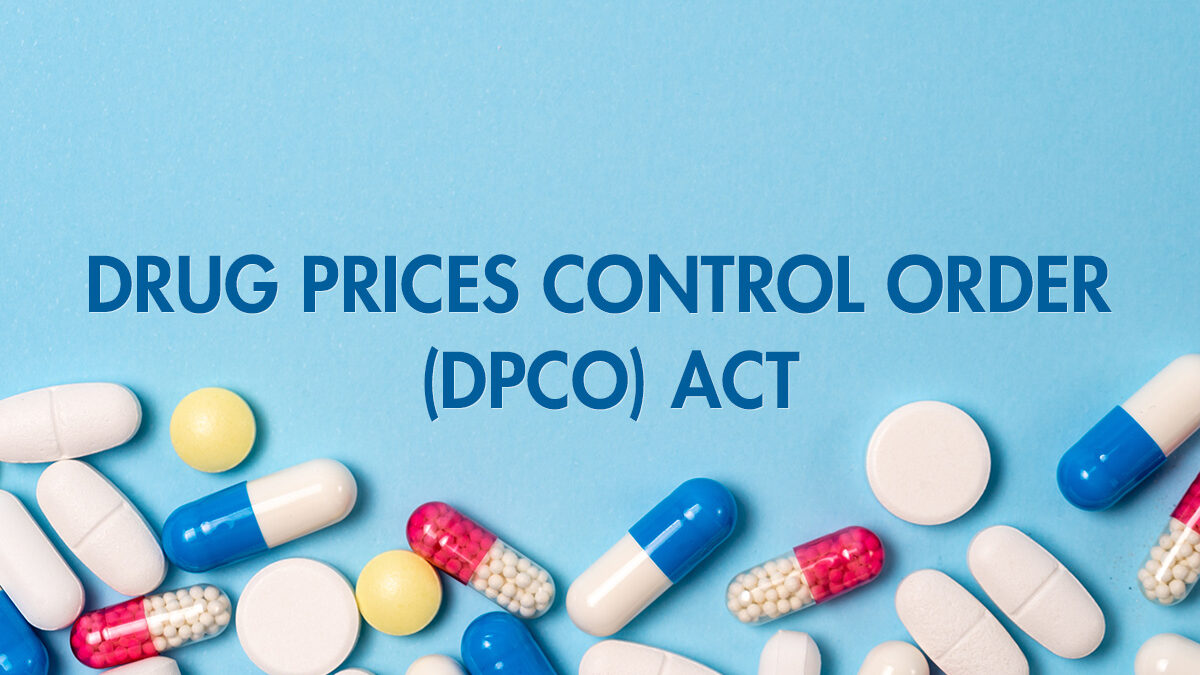Drug Price Control Act (DPCO Act)

Drug Price Control Order Act (DPCO Act) – There are some fundamental reasons that the Drug Price Control Order Act (DPCO Act) needs to come into existence in the year 1955. This policy established the availability of essential medicines in the market at affordable prices and stock. For any developing country, expenditure on medicine is the major capital loss for the middle class and can directly impact the healthcare sector of a country.

This irrational market practice can lead to a black market and critical healthcare crises for any developing country. So, it is important to take care of the basic necessity of the citizen by creating an authority that takes care of and makes sure that each one gets essential drugs at affordable rates despite changes in the domestic or global pharma industry.
Some Facts About Indian Pharma Market
- India is one of the top developing countries having the highest overhead expenses for healthcare facilities.
- The expense of medicines constitutes more than 67% (overhead cost) of healthcare in India.
- Over 65% of the population in India lacks normal healthcare facilities despite being one of the top suppliers of medicines, and generic drugs in the world.
- There are over 27 therapeutic drugs range and 628+ formulations come under DPCO Act that includes vaccines, diabetes, tuberculosis, cancer, cardiac disease, etc.
- There are over 10k pharmaceutical manufacturing companies in India.
What Do You Understand by The Drug Price Control Order Act 2013 (DPCO Act)?
The DPCO Act comes under the Essential Commodities Act (ECA). This regulation of drug price controlling also comes under the National Pharmaceutical Pricing Authority (NPPA), i.e. accountable for the execution of DPCO 2103. The basic motto behind this DPCO Policy is to establish a ceiling price for all life-saving and preventive drugs. Also, the latest implication was done in the year 2019 to ensure a balance between the producer/manufacturing interests and the consumers.
However, DPCO 2013 came into effect in May 2013 for finalizing the price of 300+ critical medicine based on manufacturing cost. Moreover, the DPCO 2013 covers much more areas following profitability and cost-effective essential medicines compared to the DPCO Act 1955. There are a series of punishments imposed for the violation of this act including fines and even imprisonment.
Main Objective Of the DPCO Act
Here is the list of the main objectives of The DPCO Order –
- To ensure the stock availability of good quality drugs at a reasonable price, especially life-saving and preventing drugs.
- Strength the quality control of the drug manufacturing system and ensuring sensible use of the drugs in the entire country.
- Encourage new advancements in pharma R&D and ensure cost-effective manufacturing of new drugs.
- Working towards strengthening the domestic manufacturing capacity of drugs.
Why We Need a Drug Price Control Order Act?
In a growing economy, there can be n factor responsible for increasing the selling price of medicines, especially in-demand, essential, and preventive drug ranges. This can lead to chaos and even lead to black market practices. To prevent this and make sure to control these factors, DPCO Act came into existence. In this, the ceiling price is set for certain drug ranges which are updated after a few years focusing on the affordability of drugs for the common man.
Without any government authority, anyone (company or manufacturing) will interfere with the pricing depending on the market condition. So, it is important to make sure every person gets essential medicine at an affordable price. That’s why DPCO Act has a significant role to play. However, the ceiling price is defined as the fixed price according to the DPCO Act 2013 by the Govt. for scheduled formulations. This ceiling price is exclusive of local tax, and excise duty.
Essential Medicine and Its Characteristics
Essential Medicine termed was presented by WHO in 1977. Any medicine that fulfills the following criteria can come under the category of essential medicines –
- Public Health applicability
- Evidence on effectiveness, and protection
- Relative price-effectiveness
Now, let’s take a look into some common characteristics of Essential Medicines –
- Essential medicine needs to be inadequately stocked all the time.
- Appropriate dosage of essential medicines needs to be in stock.
- Must be quality medicine with all the essential information labeled on the packaging.
- Essential medicine must be affordable for the citizens.
Conclusion
At last, we hope you get all the information regarding The Drug Price Control Act (DPCO Act). This balances the continuous supply of essential medicines along with taking account of the consumers and the manufacturer. This DPCO Act 2013 has much more diverse functions and objectives compared to the DPCO Act 1955. For further queries, feel free to reach out to F.C. Remedies (the Leading PCD Pharma Franchise Company in India)
Frequently Asked Questions (FAQs)
Question – What is NPPA’s role in drug price control?
Answer – NPPA or National Pharmaceutical Pricing Authority is an independent body that controls and monitors the price of drugs in India.
Question – Who is the national-level authority responsible for fixing the prices?
Answer – There are both national, state, and district-level authority that works cordially to fix the essential medicine prices – NPPA, FDA/ State Drugs controller, and distinct Drug Inspector







